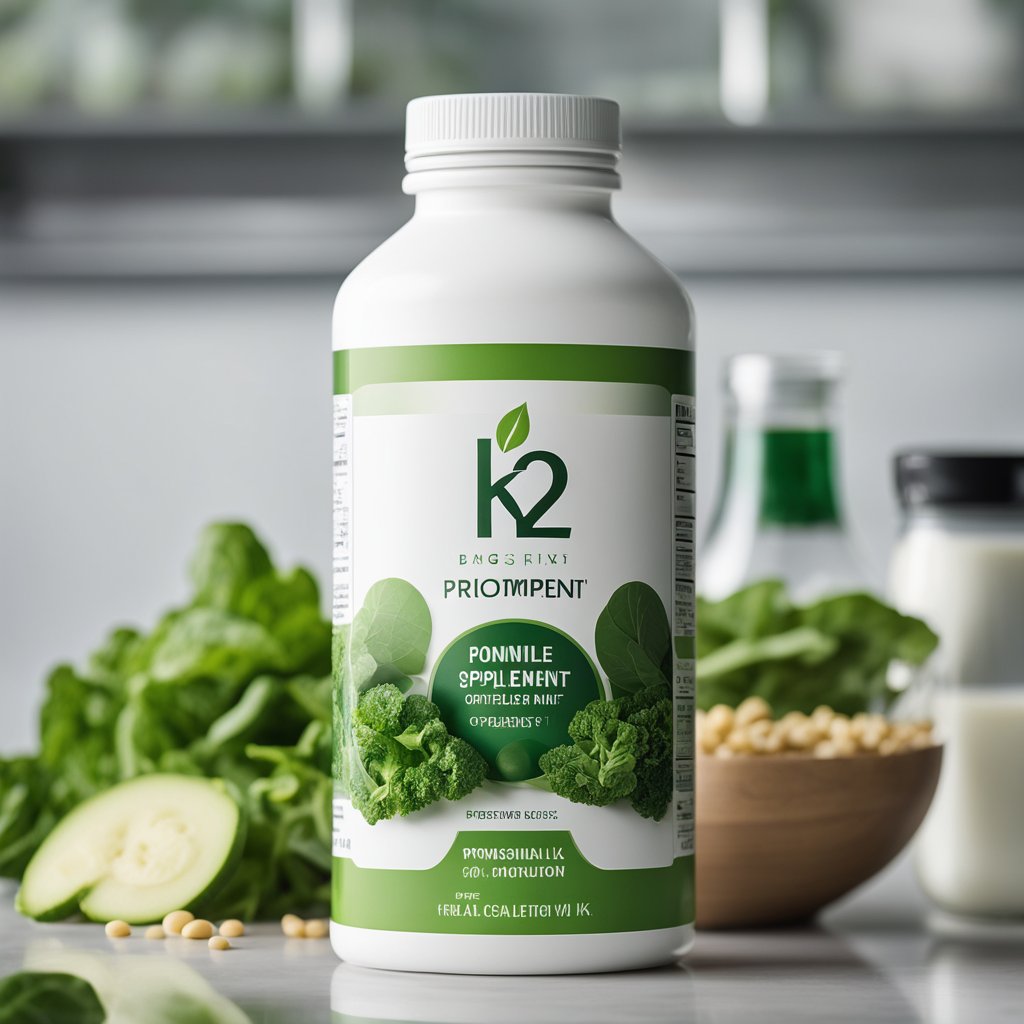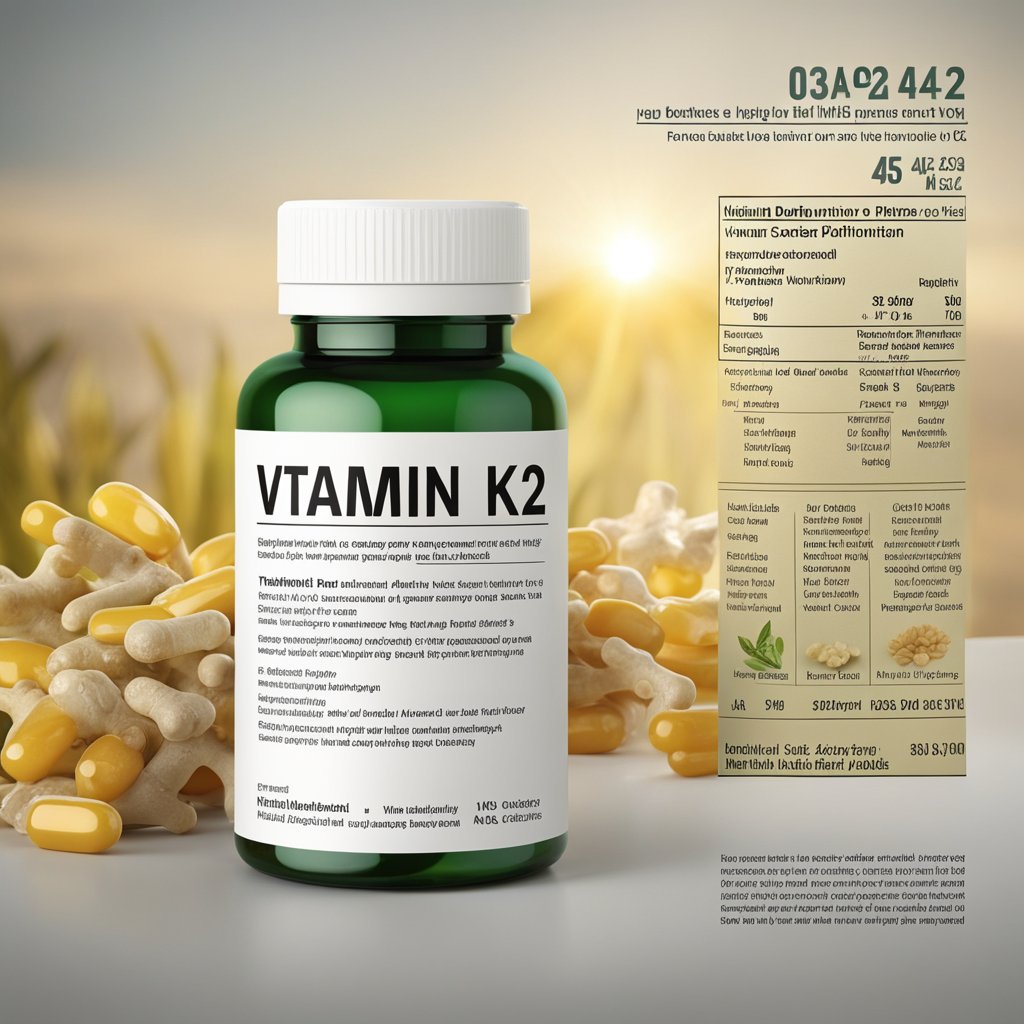Vitamin K2 is an essential nutrient that plays a critical role in many aspects of health, including bone density, cardiovascular health, and blood clotting. While vitamin K1 has long been recognized for its importance in the diet, recent research has shed light on the unique benefits of vitamin K2, distinguishing it from its more well-known counterpart. Unlike vitamin K1, which is abundant in leafy greens and easily obtained through a typical diet, vitamin K2 is found in fewer food sources and may be more challenging to consume in adequate amounts.

Supplementation with vitamin K2 can help bridge this nutritional gap for individuals who may not receive enough through diet alone. The best K2 supplements can offer a reliable source of this vital nutrient, ensuring that the body has what it needs for maintaining bone health and vascular function. When considering a vitamin K2 supplement, it’s crucial to look for products with a proven track record of quality and efficacy, as the market is wide and varied.
Key Takeaways
- Vitamin K2 is crucial for bone and cardiovascular health, with distinct benefits separate from vitamin K1.
- K2 supplementation is beneficial for those not getting enough from their diet.
- Quality and efficacy are key considerations when choosing the best K2 supplement.
Understanding Vitamin K2

Vitamin K2, or menaquinone, is a fat-soluble vitamin that plays a critical role in blood clotting and bone health. Derived from dietary sources or produced by gut bacteria, K2 works alongside vitamin K1, but with different sources and mechanisms.
History and Scientific Background
I understand that Vitamin K was first discovered in 1929 as a nutrient essential for blood coagulation. The term “K” comes from the German word “Koagulation.” It has been established that vitamin K exists in two main forms, K1 (phylloquinone) and K2 (menaquinone). While vitamin K1 is found predominantly in leafy greens, vitamin K2 is typically found in fermented foods and animal products.
Historically, the significance of vitamin K2 was overlooked, as K1 was believed to be the primary source of all vitamin K’s effects. It was not until later studies that the roles and benefits of vitamin K2 were more understood, notably its importance in calcium metabolism and bone health. The presence and action of specific bacteria in fermented foods like cheese and natto led to the discovery of menaquinones, the various forms of vitamin K2.
Different Forms: MK-4 and MK-7
Vitamin K2 further divides into several subtypes, but the most significant and well-researched are menaquinone-4 (MK-4) and menaquinone-7 (MK-7).
Menaquinone-4 (MK-4):
- Source: Found in animal products such as meats, eggs, and dairy.
- Half-life: MK-4 has a shorter biological half-life, typically around a few hours.
- Function: MK-4 is active in the regulation of gene expression and is essential for bone and heart health.
Menaquinone-7 (MK-7):
- Source: Synthesized by bacterial fermentation and found in high amounts in natto, a traditional Japanese fermented soybean dish.
- Half-life: MK-7 has a longer half-life, remaining active in the bloodstream for several days.
- Function: Greater efficacy in supporting bone mineralization and arterial health due to its longer half-life.
I recognize that the choice between MK-4 and MK-7 supplements depends on individual needs and preferences, ranging from dietary restrictions to specific health objectives. The discussions surrounding vitamin K2’s benefits have made it apparent that while both forms are effective, MK-7’s longer-lasting effects may offer advantages for sustained nutritional support.
Health Benefits of Vitamin K2
Vitamin K2 plays a crucial role in maintaining various aspects of our health, particularly in bone and cardiovascular health, as well as dental well-being and immune system support. Here’s how this important nutrient supports these key areas.
Bone Health and Calcium Metabolism
Vitamin K2 is essential for bone health. It activates proteins that help bind calcium to bones, which is critical for bone formation and strength. By regulating calcium metabolism, K2 minimizes the risk of calcium depositing in the wrong places, thereby preventing osteoporosis and fractures.
- Calcium Binding: Activates osteocalcin, which binds calcium to bones.
- Bone Density: Contributes to maintaining or improving bone density.
Cardiovascular Health and Arteries
My focus on cardiovascular health reveals that Vitamin K2 may help prevent calcification of the arteries. This is significant as it is linked to reducing the risk of heart disease. It keeps calcium out of your artery walls and other tissues where it could cause harm, promoting a healthy heart and vascular system.
- Artery Health: Helps keep arteries elastic by preventing calcium from accumulating in blood vessel walls.
- Heart Health: Supports overall heart function by potentially lowering the risk of cardiovascular complications.
Dental Health and Immune System Support
Vitamin K2 contributes to dental health by activating the protein osteocalcin, which in turn promotes the movement of calcium to teeth. This mechanism supports the maintenance of strong teeth. Additionally, K2 is recognized for its support of the immune system. It helps to modulate the immune response, which is vital for overall health and disease prevention.
- Teeth Strength: Encourages the allocation of calcium to teeth, supporting dental integrity.
- Immune Function: Aids in regulating the body’s immune response to various threats.
Dietary Sources and Supplementation
When considering vitamin K2 intake, I look at both dietary sources and supplements to ensure I’m getting enough of this essential nutrient which is important for bone health and cardiovascular function.
Natural Food Sources
My focus on natural food sources of vitamin K2 typically leads me to fermented foods and animal products. High on my list is natto, a Japanese fermented soy product that’s exceptionally rich in K2. For those on a dairy-inclusive diet, certain cheeses like Gouda and Brie, as well as butter, are beneficial choices. I also consider egg yolks and dark chicken meat as moderate sources. For the vegan population, options are limited as vitamin K2 is not abundant in plant foods; however, fermented plant foods can provide some amount. While green leafy vegetables are a good source of vitamin K1, the conversion to K2 in the human body is not very efficient, so I keep that in mind.
Choosing the Right Supplement
When I’m selecting a K2 supplement, I pay close attention to the form and quality. Supplements are available in several forms, primarily as capsules and softgels. I often recommend looking for a soy-free and gluten-free label if you have specific dietary restrictions. A vital consideration for vegetarians is to ensure the supplement is not sourced from animal products and instead uses a bacterial fermentation process. I always check that the chosen supplement has been third-party tested for purity and potency.
Dosage and Absorption
The right dosage of a vitamin K2 supplement can vary depending on individual health needs and dietary intake, making it essential to consult healthcare providers for personalized advice. When I take vitamin K2, I make sure to include dietary fat in the same meal because it’s a fat-soluble vitamin, which means it’s best absorbed when taken with fat. The bioavailability of the supplement is also influenced by other factors, for instance, whether it is in an oil or dry form. Oil-based softgels may improve absorption, making them a choice worth consideration.
Safety and Considerations
When considering a vitamin K2 supplement, I ensure that I am informed about its safety profile, including potential side effects, and how it might interact with other medications I could be taking. It’s essential to recognize that while vitamin K2 is beneficial for health, it’s crucial to approach its supplementation with caution.
Potential Side Effects
While vitamin K2 is generally considered safe, it can cause adverse effects in some individuals. Here are some potential side effects that I stay aware of:
- Allergic Reactions: Rarely, hypersensitivity to K2 supplements leading to rash or difficulty breathing.
- Digestive Discomfort: Sometimes, high doses may lead to nausea, diarrhea, or other gastrointestinal issues.
I monitor for these symptoms and seek advice from my healthcare provider if they arise.
Interactions with Medications
Vitamin K2 can interact with certain medications, particularly those affecting blood clotting. Here’s what I keep in mind:
-
Warfarin: Vitamin K2 can lessen the efficacy of anticoagulants like warfarin. If I’m using blood thinners, I always consult with my healthcare provider before starting K2 supplements.
Medication Type Interaction with Vitamin K2 Anticoagulants May reduce drug effectiveness Antibiotics Could alter vitamin K levels
Adjusting to supplementation under medical guidance ensures that my health stays in balance. If I’m taking any medications, I discuss with my healthcare provider before introducing vitamin K2 to my routine.
Frequently Asked Questions
In this section, I cover some common inquiries regarding vitamin K2, focusing on its health benefits, different forms, impact on bone health, combination with vitamin D3, sources in foods, and dosage recommendations.
What are the health benefits of taking vitamin K2 supplements for the cardiovascular system?
Vitamin K2 plays a crucial role in cardiovascular health by activating proteins that help prevent calcium deposition in the arteries. Adequate K2 levels may reduce the risk of vascular calcification, supporting heart health.
What is the difference between K2 MK-7 and other forms of vitamin K2?
K2 MK-7, or menaquinone-7, is a form of vitamin K2 renowned for its longer half-life in the bloodstream, which improves its bioavailability. This allows for more consistent blood level maintenance compared to other shorter-lived forms like MK-4.
How does vitamin K2 influence bone health, particularly in preventing or treating osteoporosis?
Vitamin K2 is vital for bone health, as it activates osteocalcin, a protein that binds calcium to the bone matrix. This process is essential for maintaining bone density and strength, making it a key nutrient in preventing and managing osteoporosis.
What should one look for when choosing a combined vitamin D3 and K2 supplement?
When selecting a D3 and K2 supplement, I ensure it has high-quality ingredients with bioavailable forms of both vitamins. I also check for the proper ratio, to optimize the synergistic effect of K2 and D3 for calcium metabolism and bone health.
Are there certain foods that are particularly high in vitamin K2?
Foods rich in vitamin K2 include fermented products like natto, certain cheeses, egg yolks, and dark chicken meat. These naturally occurring sources can contribute to the overall intake of K2 in one’s diet.
What is the recommended dosage for vitamin K2, and is it safe to take it every day?
The recommended daily dosage for K2 can vary depending on health goals and dietary intake. Standard dosages often range from 100 to 300 micrograms. I find it safe to take vitamin K2 daily when following the guidelines set by health professionals.